This simple and tasty Chicken Okra stew combines basic ingredients like okra, chicken, and carrots, then takes the dish to another level with the addition of African spices. It’s a deliciously comforting one-pot meal your family will love.
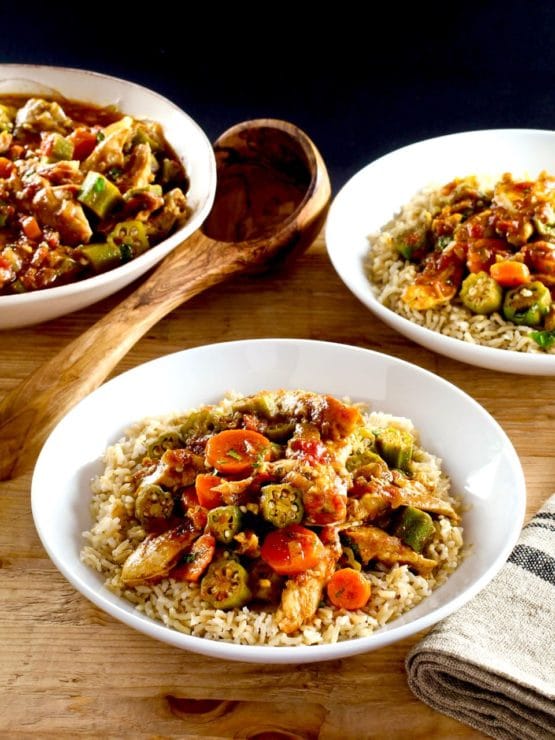
This past weekend, I celebrated a very special toddler’s 2 year-old birthday. This little boy is a precious, precocious force that has drawn our family closer together like a magnet. His arrival sparked joy in our hearts, and in these past two years he has firmly knitted himself into the fabric of our lives.
He is the beautiful result of a richly diverse ancestry– his father is an immigrant from Ethiopia, his mother a blend of caucasian, Israeli and Native American. His grandfather (sabba) is Sephardic and Ashkenazi Jewish, his grandmother is a white Christian from Virginia. His DNA is like a kaleidoscope of color and culture and history. He is a blessing on so many levels, a gift from God that brings us boundless joy.
The same weekend, white supremacists marched in Charlottesville, Virginia holding Nazi flags and shouting racial slurs. Violence broke out. People were hurt. A young woman was murdered.
Two events, juxtaposed in my mind and heart, weighing on my soul like an anchor. I sat down to write a food blog on Sunday night, and I couldn’t. It was like swimming upstream, that anchor pulling me back, any hope of progress dulled by the pain and sadness and confusion.
The people who marched held hatred in their hearts and felt comfortable advertising that hate on American soil. Those people, if they knew my family, would surely despise us simply because we are Jewish, blended, multi-cultural, tolerant. How can I think about food at a time like this?
I dare to believe all Southerners are a family. We are not merely Native, European, and African. We are Middle Eastern and South Asian and East Asian and Latin American, now. We are a dysfunctional family, but we are a family. We are unwitting inheritors of a story with many sins that bears the fruit of the possibility of ten times the redemption. One way is through reconnection with the culinary culture of the enslaved, our common ancestors, and restoring their names on the roots of the Southern tree and the table those roots support. – Michael Twitty, The Cooking Gene
Author Michael Twitty has been an online friend of mine for years; we share a love of culinary history and an endless curiosity about the roots of our food. We celebrated Passover together at my home in Los Angeles this year, and Michael created an African American Seder plate alongside our traditional family plate. We talked about the meaning of slavery, freedom, and the modern plagues we all face. That night food was education as well as sustenance. We fed our minds, our bodies and our souls.
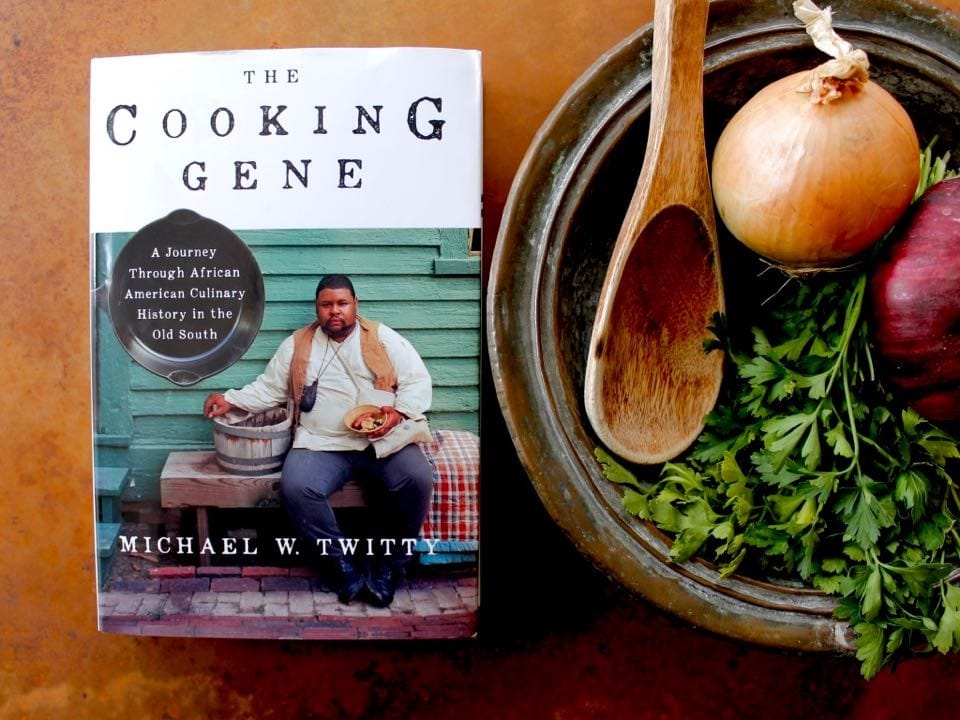
In the darkness of this weekend, Michael’s new book The Cooking Gene called to me, a clear and striking voice of reason. With every page, there is healing. This book is raw and honest. It is not an easy read, but it is vital for Americans to understand where we have been and where we are going. Unless we learn from our history we are doomed to repeat it. Our growth as a nation depends on our ability to examine the past and come to terms with it– all of it– the good, the bad, and the ugly. Only then can we begin to unite, heal, and overcome.
The Old South is a place where people use food to tell themselves who they are, to tell others who they are, and to tell stories about where they’ve been. The Old South is a place of groaning tables across the tracks from want. It’s a place where arguments over how barbecue is prepared or chicken is served or whether sugar is used to sweeten cornbread can function as culinary shibboleths. It is a place in the mind where we dare not talk about which came first, the African cook or the European mistress, the Native American woman or the white woodsman. We just know that somehow the table aches from the weight of so much… that we prop it up with our knees and excuses to keep it from falling. – Michael Twitty, The Cooking Gene.
Michael is many, many things. He is black, gay, and Jewish. He is brilliant and outspoken, passionate and brave. Michael lives for the deeper experience of food, the symbolic and historical meaning of what is served on our tables. In the face of innumerable obstacles, Michael penned a powerful and stirring book that will forever be a part of our national food history. If he managed to do that, even when faced with the sick underbelly of our nation’s racism and intolerance, I could certainly remove that heavy anchor from my spirit. The best way I knew how to do that was to get back in the kitchen and cook.
Michael shared the secret history of okra on my blog a few years back. Okra gained popularity in the American South as a culinary byproduct of the trans-Atlantic slave trade. In his post, Michael pointed out that the vegetable was a common thread amongst slaves and a reflection of their African heritage:
To the Wolof people it was kanja, to the Mandingo, kanjo, to the Akan it was nkruman and to the Fon, fevi. Okra was most often prepared in a peppery stew that was eaten with rice, millet, hominy or corn mush. It was boiled with onions and tomatoes in a saucy preparation that was eaten in the same manner, or it was boiled on its own as a fresh vegetable.
Here I have combined okra, chicken and carrots with some of my favorite North African spices to create a simple and tasty stew. The liquid created by cooked okra naturally thickens the stew’s sauce. The resulting texture is delightful, not like okra you might have tried before. This is a one-pot meal just right for the autumn months to come; it is satisfying and comforting.
I am reminded that while food provides comfort to the body, it can also be manna for the soul. At its very best, food can build bridges and bring people together. My focus is there now; the anchor is gone, and nothing hinders my progress. I move forward, inspired by Michael, wooden spoon in hand. I am open, optimistic and unafraid. We owe a certain special 2 year-old our best efforts towards a brighter future, and the change begins by looking within.
Hungry for more? Find me on Facebook, Twitter, Pinterest, YouTube and Instagram for all the latest updates!
Recommended Products:
The Cooking Gene by Michael Twitty
We are a participant in the Amazon Services LLC Associates Program, an affiliate advertising program designed to provide a means for us to earn fees by linking to Amazon.com and affiliated sites. As an Amazon Associate I earn from qualifying purchases.
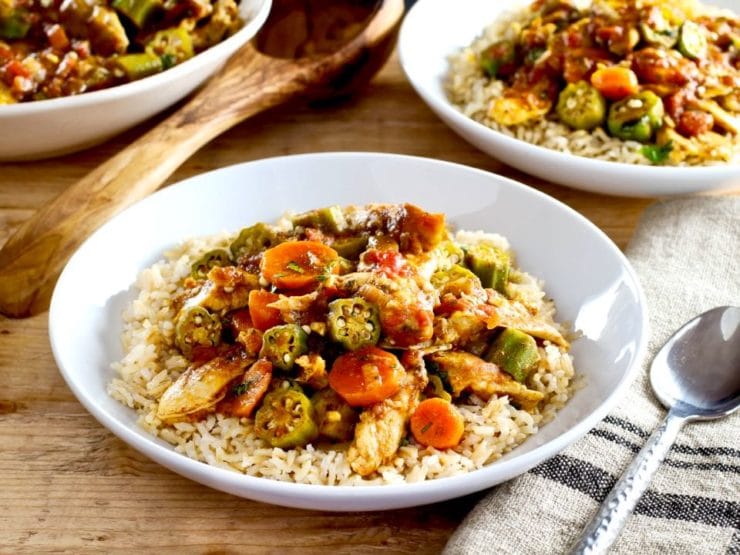
Food Photography and Styling by Kelly Jaggers
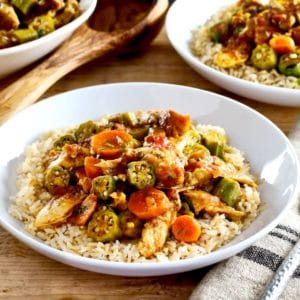
Chicken Okra Stew
Ingredients
- 2 tablespoons extra virgin olive oil
- 4 large chicken thighs, bone in, skin on (about 1 1/2 lbs)
- 1 medium onion, sliced
- 2 medium carrots, peeled and sliced
- 2 teaspoons garlic minced
- 1 pound fresh okra, cut into 1/4 inch pieces, tops discarded
- 2 cups low sodium chicken broth, or more if needed
- 1 3/4 cups diced tomatoes, or 1 can
- 3 tablespoons tomato paste
- 3/4 teaspoon paprika
- 3/4 teaspoon cinnamon
- 1/2 teaspoon cumin
- 1/4 teaspoon turmeric
- Pinch cayenne
- 1/3 cup chopped cilantro, divided (or substitute flat leaf parsley)
You will also need
- large sauté pan
Instructions
- Sprinkle chicken thighs lightly with salt and pepper. Heat olive oil in a large sauté pan with high walls over medium heat until hot. Place the chicken thighs into the hot oil, skin side down, and turn heat to medium high. Brown the thighs for about 10 minutes, flipping once halfway through, until thighs are browned on both sides and skin is golden and crisp. Remove the thighs from the pan. Do not drain the fat or juices from the pan.

- Add the sliced onion to the pan and sauté for 3-4 minutes until softened. Add the carrots and sauté them for 2-3 more minutes until the onion starts to turn golden. Add the garlic and cook for 1 minute more until fragrant.

- Add 1/2 cup chicken broth to the pan, stirring and scraping up the brown bits from the bottom of the pan as the mixture cooks. Add 1 ½ cups more broth to the pan along with the diced tomatoes, tomato paste, paprika, cinnamon, cumin, turmeric, cayenne, and 3 tbsp of the chopped cilantro or parsley. Careful with the cayenne when adding to taste, it’s extremely spicy. I usually add ¼ tsp of cayenne, which gives the stew a slight kick. Stir the mixture and bring to a boil. Add ¼ tsp salt and ¼ tsp black pepper to the pot. Stir all the ingredients, then reduce heat to a simmer.

- Put chicken thighs back in the sauté pan and ladle sauce and carrots over them. Cover the pot, vented on one side, and let the stew simmer for 45 minutes, occasionally basting the thighs with sauce, until chicken is tender.

- Uncover the pot and remove chicken thighs and skin. Stir the sliced okra into the sauce, bring to a simmer, reduce heat to low and cover again, letting the okra cook for 15-20 more minutes until tender.

- Meanwhile, cut chicken meat from the bones in thick shreds, discarding bones, skin and excess fat.

- Stir the sliced chicken back into the pot with the okra as it cooks. If the stew seems too dry, add a little chicken broth to rehydrate. Let the mixture simmer until the okra is softened and the sauce has thickened. Remove from heat and sprinkle with remaining 2 tbsp chopped cilantro. Serve stew over cooked quinoa or brown rice.

- Option: If you prefer you can keep the chicken pieces whole rather than shredding them; be sure to discard the skin before serving.

Nutrition

tried this recipe?
Let us know in the comments!
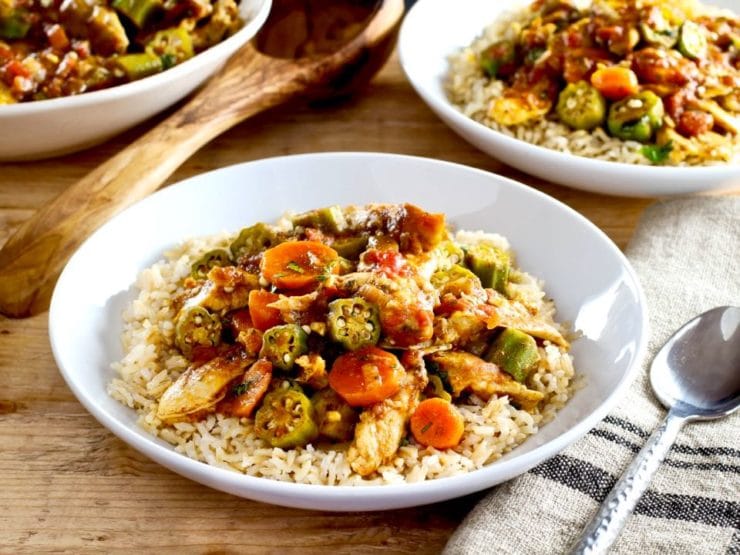

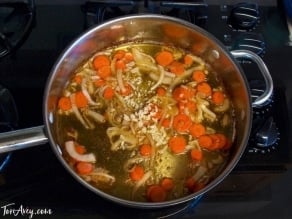
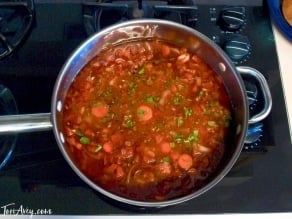
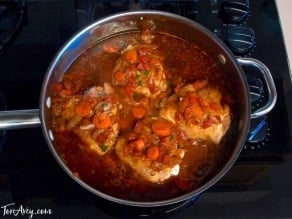
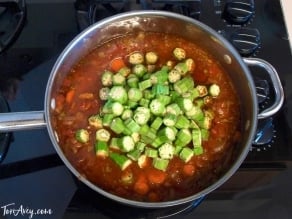
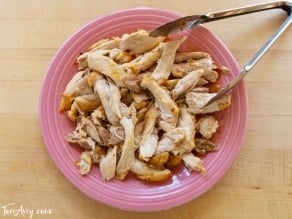
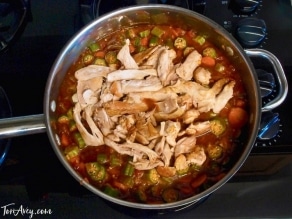
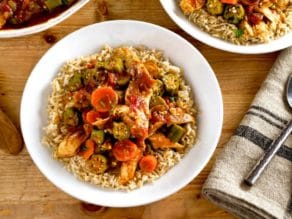


I’m curious, why crisp the skin when you remove and discard it towards the end?
It renders the fat, which then is used to cook the onions and carrots – thereby adding more flavor to the finished dish.
Lovely stew! I am always on the lookout for recipes that incorporate okra as an ingredient. We grow okra in our garden, and this is a recipe that I will make again and again. Huge culinary hit in our family!